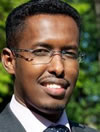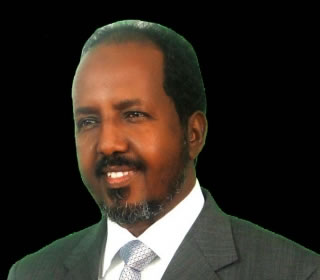 |
Abdi Aynte
Tuesday, September 11, 2012
Tuesday, September 11, 2012
 President elect Hassan Sheikh Mohamud |
The 275-member parliament, which also voted out a widely reviled former speaker and replaced him with a respected legal expert, appeared to be listening to the aspirations of the Somali people for the first time when they picked Mohamud over Ahmed. But the former President was gracious in defeat, delivering a unifying exit speech at a time when the overwhelming majority of the Somali people wanted him to strongly support his successor and cement the optics of nascent democracy.
I’ve known President Hassan Sheikh Mohamud for sometime. He’s a man of integrity and humility and a social entrepreneur who founded one of Somalia’s most successful higher education institutions: Simad University in Mogadishu. Mohamud is also accessible and intrepid – a civil society leader who endured Somalia’s 21-year-long period of war in the capital. Needless to say, he’ll now be evaluated more on his deeds than his personality.
Key tasks
Declare war on corruption: The looting of public funds by officials was the most crippling culture which decayed the last government. A new UN report found that the highest officials were swindling eight out of every ten dollars. President Mahmoud must establish and empower – legally, politically and financially – an anti-corruption commission. The commission needs to identify and uproot the deeply entrenched corruption syndicate across government sectors. In the short term, the President should also accept the Joint Financial Management Boardenvisaged by the international community. The JFMB is designed to ensure transparency and accountability of public funds, but this tool cannot be a long term solution.
Rebuild competent state institutions: After eight years, two Presidents, five Prime Ministers and hundreds of millions of dollars donated by the international community, the only institution that the now expired Transitional Federal Government (TFG) can show its worth for is the National Security Agency (NSA), the intelligence arm of the security services, which is heavily bankrolled by the US, France and other powers. Virtually all other institutions are nothing more than a few lanky men with laptops, folders and Gmail accounts preying upon the innocent public and unsuspecting donors. President Mohamud needs to identify the most vital institutions that should be rebuilt – chiefly the police, the military and coast guard. The quantity of members of the current police and military is not the issue, it’s the required quality that is categorically nonexistent.
Reconciliation: There are 2 entities that must be engaged immediately. First, President Mohamud must continue the positive talks between the TFG and the self-declared Republic of Somaliland. The engagement with Somaliland needs to be based on mutual respect, recognition of the human rights atrocities committed by Mohamed Siyad Barre’s dictatorship against Somaliland and exploration of a common path between the two brothers. Second, President Mohamud should form a new, credible National Reconciliation Commission whose main task is to reach out to the nationalist elements within al-Shabaab. Some of these figures have had a personal beef with the former president Sharif Sheikh Ahmed, whom they consider to have betrayed them. There’s a good chance that pragmatic figures will now abandon al-Shabaab and rejoin the national dispensation, all the while isolating the global jihadist wing.
Constitutional and governmental overhaul: the now defunct TFG had imposed a new ‘Draft Constitution’ on the Somali people with almost no public consultations. The document institutionalizes sectarianism, sets the country on the road to renewed, clan-based civil unrest and effectively puts the duly elected President on a collision course with his appointed future Prime Minister. The document grants oversized powers to an unelected Prime Minister over the elected president – a perennial source of infighting in the government. The ‘Constitution’ also creates a convoluted and unworkable federal structure for one of the most homogeneous and smallest countries (population wise) in Africa.
Despite resistance from some corners, President Mohamud must be bold in re-drafting the constitution and reducing the job of the prime minister to a subordinate figure responsible for coordinating cabinet business. But the president must also recognize and appreciate the aspirations of the Somali people who yearn for local control over their government and the delivery of rudimentary services at the local and regional level. He must stand firm so that he can achieve these aspirations without creating a practically inapplicable federal structure. The UK system of governance provides an excellent model, where decentralized authority ensures fair political representation both at local and national levels.
The role of external actors
For years, members of the international community have been micromanaging the politics of Somalia from afar, often in pursuit of wrongheaded policies. The exception to this is the African Union peacekeeping force (AMISOM), which has shown a remarkable degree of neutrality.
In order for this government to succeed, external actors must take two steps:
First, they should immediately cease their appetite for meddling and imposing their will on Somali governments. President Mohamud has an unrivaled legitimacy from the Somali people. The Nairobi-based politicians should give him space to chart his own path – and make mistakes along the way.
First, they should immediately cease their appetite for meddling and imposing their will on Somali governments. President Mohamud has an unrivaled legitimacy from the Somali people. The Nairobi-based politicians should give him space to chart his own path – and make mistakes along the way.
Second, the international community ought to change the culture of supporting individuals over institutions. Much of the failure of Somalia’s institutions stems from foreign powers giving an outsized influence to unelected politicians and armed groups. The most jarring example was handing over the whole Roadmap Process that has brought us to this point, to six, widely unpopular and unrepresentative politicians. A phalanx of foreign-backed armed groups – Ahlu-Sunna Wal-Jama and Raskamboni, among others – continues to challenge the authority of security forces.
Finally, President Mohamud needs to begin the difficult task of taming extremely high expectations. The monumental challenges currently facing the country are simply too prohibitive for one leader to tackle. He must, however, demonstrate the will to usher in change.
Abdi Aynte is a Somali-American journalist and researcher. He can be reached atabdi.aynte@gmail.com

No comments:
Post a Comment